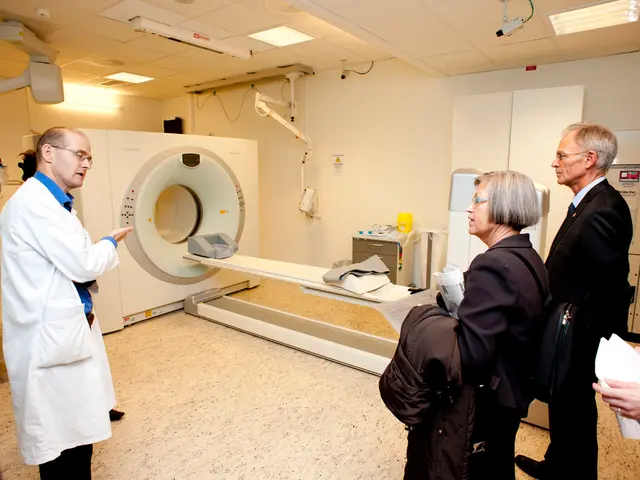Pennsylvania legislators plan to safeguard vaccine availability after Robert F. Kennedy Jr. secures appointments in influential CDC positions.
In the midst of a significant shift in the CDC's Advisory Committee on Immunization Practices (ACIP), Pennsylvania lawmakers are taking action to safeguard the accessibility of life-saving immunizations.
The recent overhaul of the ACIP, spearheaded by Health Secretary Robert F. Kennedy Jr., a known vaccine skeptic, has led to notable changes in vaccine recommendations that could impact public school vaccine requirements not only in Pennsylvania but nationwide.
Key changes and impacts include the recommendation for all adults and children 18 years and younger to receive seasonal influenza vaccines only in single-dose formulations that are free of the preservative thimerosal. Pregnant women are also advised to receive only thimerosal-free single-dose flu vaccines. The panel has also approved one dose of clesrovimab, a monoclonal antibody for infants whose mothers lack respiratory syncytial virus (RSV) protection, and updated the Vaccines for Children Program to include prevention of RSV.
Moreover, the committee has established work groups to evaluate the cumulative effects of the childhood immunization schedule and reassess vaccines that have not been scrutinized in over seven years. This includes the potential reexamination of the necessity of the hepatitis B vaccine at birth, signaling a potential review of existing vaccine mandates for children.
These developments have sparked concerns among medical experts, including the American Medical Association, who have expressed apprehension about the expertise and transparency of the newly appointed committee members. They warn that these shifts could undermine confidence in vaccine recommendations and complicate public health efforts.
In response to these changes, Rep. Arvind Venkat, an Allegheny County physician, has proposed a bill to require private insurers and Medicaid to cover vaccines approved by the Food and Drug Administration and recommended by professional medical societies. The bill aims to prevent lapses in insurance coverage for vaccines, even if federal vaccine recommendations change.
Gov. Josh Shapiro has expressed concern about the impact of the reconstituted ACIP on public health and Pennsylvania's economy, given that several vaccine manufacturers operate in the commonwealth. Pennsylvania lawmakers are also concerned about the growing influence of vaccine skeptics in federal public health roles.
If passed, Venkat's legislation would protect Pennsylvanians' health if the new panel members fail to recognize established scientific evidence and either restrict or withdraw their recommendations for existing FDA-approved vaccines. The bill would ensure that life-saving immunizations remain accessible despite ideological shifts.
Bethany Rodgers, a USA TODAY Network Pennsylvania investigative journalist, has been reporting on these developments. The article originally appeared on Erie Times-News. Shapiro stated, "Health care in the United States and in Pennsylvania must be rooted in science."
As the ACIP continues to review and potentially revise vaccine recommendations, school health officials in Pennsylvania will need to closely monitor updates to ensure that policies align with established scientific evidence and maintain the safety and health of students.
- The shifts in the ACIP, driven by Health Secretary Robert F. Kennedy Jr.'s overhaul, may bring changes to public school vaccine requirements across the nation.
- The panel now recommends that all adults and children receive seasonal influenza vaccines only in thimerosal-free, single-dose formulations.
- Pregnant women are advised to receive thimerosal-free single-dose flu vaccines as well.
- Clesrovimab, a monoclonal antibody for infants whose mothers lack RSV protection, has been approved by the committee.
- The committee has also updated the Vaccines for Children Program to include RSV prevention.
- Work groups have been established to evaluate the cumulative effects of the childhood immunization schedule and reexamine vaccines not scrutinized in over seven years.
- The hepatitis B vaccine at birth might potentially be reviewed as a result of these modifications.
- Medical experts, such as the American Medical Association, have raised concerns about the expertise and transparency of the new committee members.
- Their apprehension is that these shifts could undermine confidence in vaccine recommendations and hinder public health efforts.
- Rep. Arvind Venkat's proposed bill aims to ensure vaccine coverage by private insurers and Medicaid for vaccines approved by the Food and Drug Administration and recommended by professional medical societies.
- This bill would prevent insurance lapses even if federal vaccine recommendations change.
- Gov. Josh Shapiro has expressed concern about the impact of the new ACIP on public health and Pennsylvania's economy.
- Pennsylvania lawmakers are alarmed by the growing influence of vaccine skeptics in federal public health roles.
- Bethany Rodgers, a USA TODAY Network Pennsylvania investigative journalist, has been reporting on these developments.
- Shapiro emphasized, "Health care in the United States and in Pennsylvania must be rooted in science."
- School health officials in Pennsylvania must closely monitor updates to ensure policies align with established scientific evidence and prioritize student safety and health.
- Beyond vaccines, other health and wellness matters, such as fitness and exercise, mental health, men's health, skin care, and nutrition, require ongoing attention and evidence-based policies.
- Ensuring accessibility to therapies and treatments for chronic diseases like cancer, diabetes, and autoimmune disorders, as well as medical conditions affecting digestive health, eye health, hearing, respiratory conditions, cardiovascular health, and neurological disorders, is crucial for overall health and well-being.








